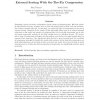Free Online Productivity Tools
i2Speak
i2Symbol
i2OCR
iTex2Img
iWeb2Print
iWeb2Shot
i2Type
iPdf2Split
iPdf2Merge
i2Bopomofo
i2Arabic
i2Style
i2Image
i2PDF
iLatex2Rtf
Sci2ools
107
click to vote
BNCOD
2003
2003
External Sorting with On-the-Fly Compression
Evaluating a query can involve manipulation of large volumes of temporary data. When the volume of data becomes too great, activities such as joins and sorting must use disk, and cost minimisation involves complex trade-offs. In this paper, we explore the effect of compression on the cost of external sorting. Reduction in the volume of data potentially allows costs to be reduced (through reductions in disk traffic and numbers of temporary files), but on-the-fly compression can be slow and many compression methods do not allow random access to individual records. We investigate a range of compression techniques for this problem, and develop successful methods based on common letter sequences. Our experiments show that, for a given memory limit, the overheads of compression outweigh the benefits for smaller data volumes, but for large files compression can yield substantial gains, of one-third of costs in the best case tested. Even when the data is stored uncompressed, our results...
| Added | 31 Oct 2010 |
| Updated | 31 Oct 2010 |
| Type | Conference |
| Year | 2003 |
| Where | BNCOD |
| Authors | John Yiannis, Justin Zobel |
Comments (0)

